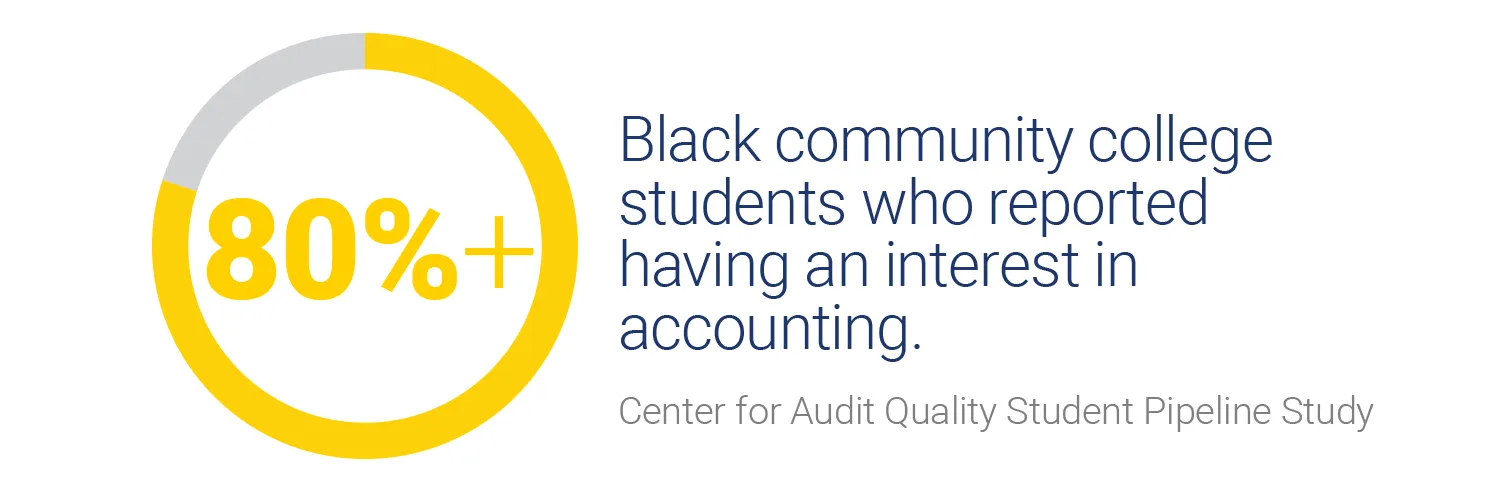The accounting profession has made significant investments in diversity, equity and inclusion (DEI) initiatives—more than $470 million—to help bring more diverse talent to the profession. The industry is working collectively to encourage students from diverse backgrounds to study accounting in college and to highlight accounting as a rewarding career.
However, industry representatives recognize that although the profession has seen an increase in some groups entering the field, more progress needs to be made. The number of Black people entering the profession has remained stagnant since we started analyzing demographic trends, over the past 20 years says, Liz Barentzen, Vice President of Operations and Talent Initiatives for the Center for Audit Quality (CAQ), which represents public company auditors and works to improve audit quality in the United States. This is despite the fact that the percentage of undergraduate college students identifying as people of color is currently 45 percent, compared with 30 percent in 1996.
“We know that businesses across industries are strengthened when they employ individuals with different backgrounds, ideas and experiences,” said Barentzen. “That’s why as a profession we can – and must – do more.”
Concern about the lack of diversity isn’t new to the profession. CAQ’s member firms have been discussing the issue since 2017 when PwC’s US Chairman and Senior Partner Tim Ryan established CEO Action for Diversity and Inclusion, a group of CEOs across 85 industries pledging to advance diversity and inclusion in the workplace. “We’ve had – and continue to have – conversations at the board level about the need for more equitable representation within the talent pipeline and across the profession,” Barentzen says.
In early 2020, the CAQ invited the chief diversity officers from its eight member firms to discuss tangible ways to increase diversity, equity and inclusion within the profession, Barentzen says. The major instances of social injustice in early 2020 and resulting protests “really elevated and propelled the discussion forward,” she says.
The current landscape
About 60% of the people holding a Bachelor of Accounting degree identify as white, according to the Integrated Postsecondary Education Data System, compared with 7% identifying as Black or African American and 13% identifying as Hispanic or Latino.
To get a better understanding of why so few Black and Hispanic students pursue an accounting degree, the CAQ surveyed nearly 4,000 students. Results showed that Black and Hispanic business majors who have either considered accounting degrees or have taken introductory accounting courses perceive several barriers to entering the profession. These include concerns about a career in accounting being unfulfilling, a perceived lack of passion or interest for the work and financial considerations related to obtaining CPA licensure.
In other words, “More needs to be done to change perceptions and support students on their career journeys,” said Barentzen.
Ways to diversify the talent pipeline
To help change perceptions about the profession, the CAQ is partnering with NABA Inc.—the National Association of Black Accountants—to help Black community college students seamlessly transfer into a historically Black college or university (HBCU) to pursue a four-year degree in accounting.
CAQ’s research found that Black community college students had the highest level of interest in becoming an accountant. “Over 80 percent of Black community college students that we surveyed reported having an interest in accounting, but that initial interest is not translating into greater numbers of accounting majors,” Barentzen says.

To help make that transition easier, CAQ partnered with NABA to develop a pilot program with three community colleges and three HBCUs in Maryland, Virginia and Washington, D.C., which will work together to help Black students interested in pursuing an accounting degree seamlessly transfer into a four-year accounting program at an HBCU. “We’re developing a hands-on program for students so they’re connected to mentors, tutoring services and other resources to help them,” says Guylaine Saint Juste, president and CEO of NABA Inc.
CAQ and NABA plan to expand the pilot program in the future.
“Getting a degree in accounting will open up lots of possibilities,” Saint Juste says. “The language of money is accounting. The language of wealth is accounting. The language of business is accounting. I think that once you get that degree in accounting, the sky's the limit.”
Yet, many Black students are hesitant to pursue a career in accounting. “When you look at partners in firms, less than half a percent of partners in firms are Black,” Saint Juste says. Many young students, particularly Black students, wrongly believe they need to have stellar math skills to succeed as an accountant.
Advances in technology have changed the skillsets needed to excel in the profession. “It's not a math-based career anymore,” Barentzen says. Communication skills and the ability to interpret and understand data are the essential skills needed today.
Added Barentzen, “Changing perceptions around what skillsets are actually needed is critical.” The CAQ is working with Culture One World, a minority-owned creative agency, to develop a campaign, Accounting+, that will help shift perceptions about accounting among younger, more diverse audiences. The campaign utilizes platforms like TikTok and Instagram to reach younger audiences. “We need to reach students where they are and our research shows that social media is a place where kids are getting information about careers,” Barentzen days.
One message that especially resonates with Black students is that accounting is a path to entrepreneurship. “A pathway in accounting offers you a pathway to prosperity,” Saint Juste says.
Measuring success
The profession doesn’t expect to see success overnight, next year or perhaps not even in two years, Barentzen says. Long-term success means seeing more diversity in the talent pipeline and that will take time.
While every member firm has its own individual DEI hiring targets, the average goal of increasing workforce diversity is 45 percent. For instance, PwC has a goal of reaching 35% Black and Hispanic and Latino representation among experienced, entry-level hires and interns. PwC also is aiming for 50% of its partnerships to be made up of women and racially/ethnically diverse individuals in its effort to develop a US workforce that reflects the diversity seen in higher education. Grant Thornton is working on a 25% increase in new hires identifying as Black or African American, Hispanic or Latino.
“The goals that the firms have set are ambitious and they clearly demonstrate the importance of diversity within the profession, but we need to diversify that pipeline, and the only way to do that is collectively,” Barentzen says. “We need to increase the number of accounting graduates over time before we can see the numbers increase meaningfully within the firms.” The profession will share best practices and research, as well as its progress, related to diversity and inclusion via its Bold Ambition campaign.
NABA plans to measure success through the impact of its program. “We know that Black representation continues to be pretty stagnant at 5 percent so, for me, impact would be that five years from now, we see that Black representation in the field is up to 6 percent,” Saint Juste says. “I know somebody would say it's just 1 or 2 percent, but then we've actually moved the needle.”
Another indication of success for NABA will be the program’s retention rate, Saint Juste says. NABA would like to see more Black graduates earning an accounting degree compared with other degrees.
However, to truly move the needle on diversity, Saint Juste says, employees at accounting firms need to look more like the general population. “We need to stop talking about diversity, and we need to start to talk about inclusion,” she says. “I don't know how we create inclusion without belonging, and we can't create belonging without representation.”










